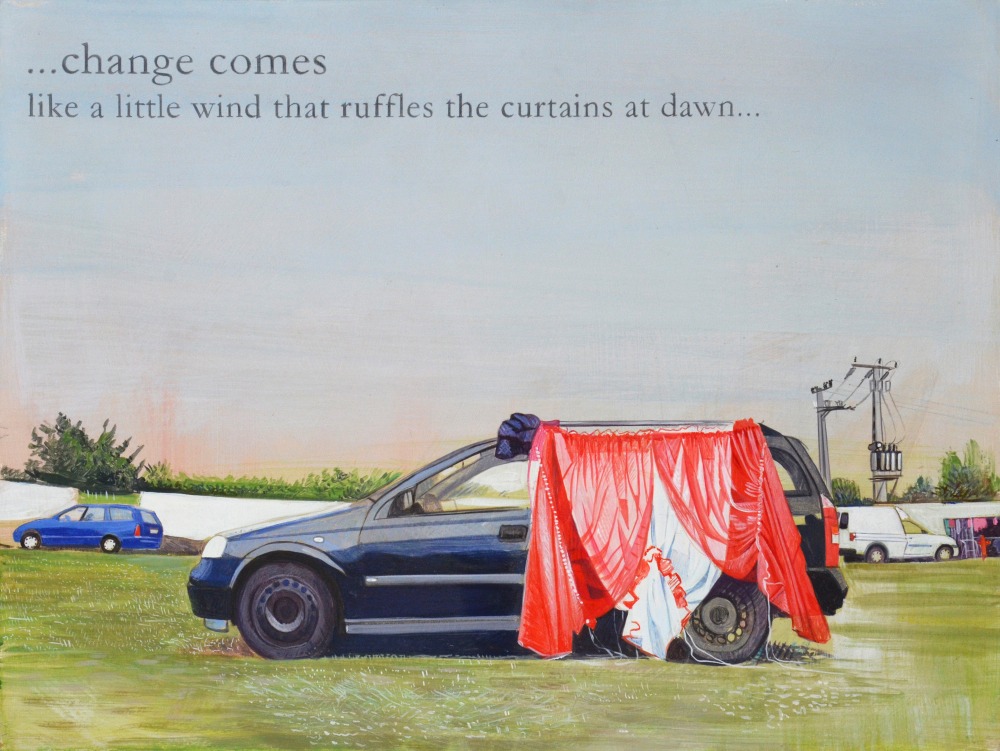Johanna Kandl + Anna Witt
Stoff | Unboxing the Future
24 Oct - 21 Dec 2019
JOHANNA KANDL + ANNA WITT
Stoff | Unboxing the Future
24 October - 21 December 2019
"Stoff" can mean many things: on the one hand, the textile material out of which clothing, tablecloths, curtains and similar objects are produced. On the other hand it stands for a haptic objectivity that one can capture, or as the content of a narrative structure that one attempts to comprehend. When an exhibition is called "Stoff", then the viewer may assume that the artist is playing with notions of ambivalence. In the works by Johanna Kandl in this exhibit, there is one which takes the term literally and shows multicoloured cloths tossed into folds in a fabric shop.
Yet essentially, for Kandl and for the film- and video-artist Anna Witt, the issue is the "Stoff" from which suffering arises. And, in concrete terms, that suffering that accompanies a globalised and casualised work environment. In the works, with their own design media, a political agenda is artistically introduced which takes an interest in those who do not count. Or, as Aristotle once put it, those 'who have a stake in nothing'.
Johanna Kandl thematises latent and obvious contradictions in contemporary processes of production and distribution with her image-text vignettes that have become part of her programme. Their visual prototypes are rooted in photographs resulting from journeys in a wide variety of regions of the world and in differing political backgrounds. These materials are, however, not transposed hyper-realistically into painting, but instead are mainly transformed using tempera colours into very finely graduated colouristic spectacles, in which the midday heat of southern lands often appears to vibrate.
People often are not individualised, but are congealed into ciphers who bear burdens and very obviously are ensuring their survival at the lowest end of the food chain. When, in the poor area of a Georgian city, slogans such as "Go" or "Get Rich" are displayed, then this sheds a garish highlight on the iniquity of relationships in the contemporary world. It has to do with demonstrating the "share of those without a stake".
The three-channel installation "Unboxing the Future" (2019) by Anna Witt in turn proceeds from a sweeping question: how do artificial intelligence and automatization influence working situations in an industrial metropolis such as Toyota City, and what effect do these have on human beings? The workers extracted movements from out of their daily routines and transformed them into a collective choreography. Thus an almost zen-like cinetic ballet of movements, to gentle strains of koto, arose that, with all its beauty, never allows one to forget that it was derived from a Fordian adjustment and reduction of human possibilities. Both artists, if we want to reduce it to a formula, are concerned with demonstrating the "share of those without a stake".
(Thomas Miessgang, Vienna 2019)
Stoff | Unboxing the Future
24 October - 21 December 2019
"Stoff" can mean many things: on the one hand, the textile material out of which clothing, tablecloths, curtains and similar objects are produced. On the other hand it stands for a haptic objectivity that one can capture, or as the content of a narrative structure that one attempts to comprehend. When an exhibition is called "Stoff", then the viewer may assume that the artist is playing with notions of ambivalence. In the works by Johanna Kandl in this exhibit, there is one which takes the term literally and shows multicoloured cloths tossed into folds in a fabric shop.
Yet essentially, for Kandl and for the film- and video-artist Anna Witt, the issue is the "Stoff" from which suffering arises. And, in concrete terms, that suffering that accompanies a globalised and casualised work environment. In the works, with their own design media, a political agenda is artistically introduced which takes an interest in those who do not count. Or, as Aristotle once put it, those 'who have a stake in nothing'.
Johanna Kandl thematises latent and obvious contradictions in contemporary processes of production and distribution with her image-text vignettes that have become part of her programme. Their visual prototypes are rooted in photographs resulting from journeys in a wide variety of regions of the world and in differing political backgrounds. These materials are, however, not transposed hyper-realistically into painting, but instead are mainly transformed using tempera colours into very finely graduated colouristic spectacles, in which the midday heat of southern lands often appears to vibrate.
People often are not individualised, but are congealed into ciphers who bear burdens and very obviously are ensuring their survival at the lowest end of the food chain. When, in the poor area of a Georgian city, slogans such as "Go" or "Get Rich" are displayed, then this sheds a garish highlight on the iniquity of relationships in the contemporary world. It has to do with demonstrating the "share of those without a stake".
The three-channel installation "Unboxing the Future" (2019) by Anna Witt in turn proceeds from a sweeping question: how do artificial intelligence and automatization influence working situations in an industrial metropolis such as Toyota City, and what effect do these have on human beings? The workers extracted movements from out of their daily routines and transformed them into a collective choreography. Thus an almost zen-like cinetic ballet of movements, to gentle strains of koto, arose that, with all its beauty, never allows one to forget that it was derived from a Fordian adjustment and reduction of human possibilities. Both artists, if we want to reduce it to a formula, are concerned with demonstrating the "share of those without a stake".
(Thomas Miessgang, Vienna 2019)

